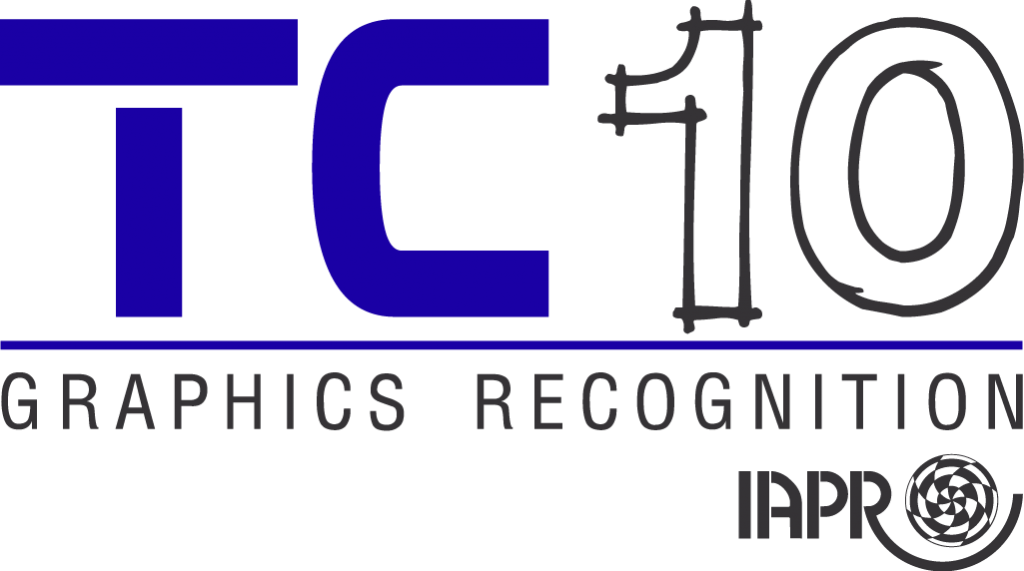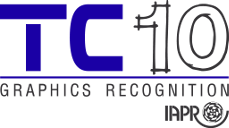

ICDAR 2019 have been a great edition. Thanks to the organizing committee, keynote, participants for providing the document analysis community with excellent discussions, interactions and innovations.
Congratulations to Prof. Andreas Dengel for its IAPR/ICDAR Outstanding Achievements Award, Dr. Faisal Shafait and Dr. Xiang Bai for the IAPR/ICDAR Young Investigator Awards!
GREC 2019 has been very interactive and successful with more than 100 participants at is peak. Thank you to the organizers and all the attendees.
This newsletter includes reports for GREC and SSDA 2019, call for papers for ICPR, DAS and DIAGRAMS 2020 as well as a special issue on Deep learning for graphics recognition: document understanding and beyond.
Finally, new datasets and educational materials have been added to TC10 website.
Christophe Rigaud
IAPR-TC10 Communications Officer
Table of content:
1) Upcoming deadline and events
2) GREC 2019 report
3) GREC-IJDAR special issue
4) IJDAR articles alert
5) SSDA report
6) ICPR 2020 conference
7) DAS 2020 workshop
8) DIAGRAMS conference 2020
9) ICFHR 2020 call for competitions
10) Datasets and materials (update)
11) Job offers
Call for Contributions: please contribute to TC10 newsletters, by sending any relevant news, event, notice, open position, dataset or link to us on iapr.tc10[at]gmail.com
1) Upcoming deadlines and events
2019
- December 13 abstract submission deadline for DAS 2020
- December 13 competition proposal deadline for ICFHR 2020
2020 and later
- January 10
20, 2020, paper submission deadline IJDAR special issue - January 24, 2020, paper pre-submission deadline DIAGRAMS 2020
- March 2, 2020, paper submission deadline for ICPR 2020
- March 5, 2020, paper submission deadline for ECCV 2020
- May 17-20, 2020, workshop DAS 2020, Wuhan, China
- August 23-28, 2020, conference ECCV 2020, Glasgow, UK
- September 8-10, 2020 conference ICFHR 2020, Dortmund, Germany
- September 13-18, 2020 conference ICPR 2020, Milan, Italy
- September 7-10, 2021 conference ICDAR 2021, Lausanne, Switzerland
- December, 2022 conference ICFHR 2022, Hyderabad, India
2) GREC 2019 report
13th IAPR International Workshop on Graphics Recognition (GREC 2019)
http://grec2019.univ-lr.fr/
20-21 September 2019, Sydney, Australia
The GREC workshop was a great opportunity for researchers to meet colleagues and to share new ideas and knowledge about graphics recognition methods. In this edition, 23 papers were presented, followed by highly interactive discussions. Some topics such as comics analysis, music score segmentation, sketch analysis, symbol classification were addressed by the participants. The first day of the workshop hosted more than 100 participants. The GREC organizers would like to thank all participants, since we could indeed enjoy a highly interactive GREC workshop, with many fruitful discussions concerning graphics recognition topic.
Jean-Christophe BURIE
General chair
3) IJDAR special issue
The TC10 (Technical Committee on Graphic Recognition) proposes a special issue to be published in the International Journal of Document Analysis and Recognition (IJDAR), Springer Nature:
Deep learning for graphics recognition: document understanding and beyond
This special issue is aimed to report the original and innovative advances in Graphics Recognition using deep learning methods. Thus, articles presenting reviews, perspectives, new methods and applications using deep learning for graphics recognition are cordially invited.
Guest editors : K.C. Santosh, University of South Dakota, USA – Jean-Christophe Burie, La Rochelle Université, France – Alicia Fornés, Universitat Autònoma de Barcelona, Spain – Muhammad Muzzamil Luqman, La Rochelle Université, France
Important dates
Paper submission deadline: Jan 10, 2020
First review notification: March 20, 2020
Decision (final notification): June 20, 2020
Production (Springer, IJDAR): August, 2020
More details at https://iapr-tc10.univ-lr.fr/?page_id=645
4) IJDAR article alert
Volume 22, Issue 3, September 2019
Special issue: Advanced Topics in Document Analysis and Recognition
https://link.springer.com/journal/10032/22/3
Articles are currently freely available (few weeks after conference).
- Editorial for special issue on “Advanced Topics in Document Analysis and Recognition”
Cheng-Lin Liu, Andreas Dengel…
- Are 2D-LSTM really dead for offline text recognition?
Bastien Moysset, Ronaldo Messina
- Boosting scene character recognition by learning canonical forms of glyphs
Yizhi Wang, Zhouhui Lian, Yingmin Tang…
- Generalized framework for summarization of fixed-camera lecture videos by detecting and binarizing handwritten content
Bhargava Urala Kota, Kenny Davila…
- Dynamic temporal residual network for sequence modeling
Ruijie Yan, Liangrui Peng, Shanyu Xiao…
- A comparison of local features for camera-based document image retrieval and spotting
Quoc Bao Dang, Mickaël Coustaty…
- Comic MTL: optimized multi-task learning for comic book image analysis
Nhu-Van Nguyen, Christophe Rigaud…
- A two-stage method for text line detection in historical documents
Tobias Grüning, Gundram Leifert…
- On optimal stopping strategies for text recognition in a video stream as an application of a monotone sequential decision model
Konstantin Bulatov, Nikita Razumnyi…
- An anchor-free region proposal network for Faster R-CNN-based text detection approaches
Zhuoyao Zhong, Lei Sun, Qiang Huo
- Handwritten Arabic text recognition using multi-stage sub-core-shape HMMs
Irfan Ahmad, Gernot A. Fink
- Coarse-to-fine document localization in natural scene image with regional attention and recursive corner refinement
Anna Zhu, Chen Zhang, Zhi Li, Shengwu Xiong
Volume 22, Issue 4, December 2019
https://link.springer.com/journal/10032/22/4
- Evaluation of word spotting under improper segmentation scenario
Sounak Dey, Anguelos Nicolaou, Josep Lladós
- Patch-based offline signature verification using one-class hierarchical deep learning
Sima Shariatmadari, Sima Emadi…
- HWNet v2: an efficient word image representation for handwritten documents
Praveen Krishnan, C. V. Jawahar
- HanFont: large-scale adaptive Hangul font recognizer using CNN and font clustering
Jinhyeok Yang, Heebeom Kim, Hyobin Kwak…
- A novel feature transform framework using deep neural network for multimodal floor plan retrieval
D. Sharma, N. Gupta, C. Chattopadhyay…
5) SSDA report
The 3rd IAPR Summer School on Document Analysis 2019 was organized by National University of Sciences and Technology (NUST) in collaboration with Pakistan Pattern Recognition Society (PPRS) from August 19 -23, 2019 which the objective to impart the knowledge of state-of-the-art techniques in Pattern Recognition, particularly Deep Learning with their relevance to Document Analysis. Insightful talks and lectures, delivered by experts from all around the world, introduced the field of document analysis to the local participants along with advanced techniques and open challenges. The main topics covered during the five-day summer school included fundamentals of Document Analysis, Pattern Recognition, Deep Learning and the open research directions in document analysis and recognition.
The learning material was delivered in the form of lectures and hands-on practical sessions. The notable speakers who were a part of SSDA were Prof. Dr. Cheng-Lin Liu from China, Prof. Dr. Marcus Liwicki from Sweden, Prof. Dr. Ulrich Schwanecke and Prof. Dr. Adrian Ulges from Germany, Prof. Dr. Seiichi Uchida from Japan, and Dr. Sheraz Ahmed from Germany. A programming and poster competition was also organized during the summer school, providing the participating students a chance to present their existing research work and get the expert feedback from international speakers.
One hundred and twenty-nine participants attended the event among which thirty were professionals from industry and academia, six were international students, while the remaining were local students from different areas of Pakistan including Abbottabad, Bahawalpur, Hazara, Lahore, Faisalabad, Multan, Karak, Taxila, Peshawar, Azad Kashmir, and Mianwali. In order to assure maximum participation of the students and to promote the research in document analysis and pattern recognition at the national level, stipends to selected international and local students were awarded on behalf of IAPR.
In order to acquaint the speakers and participants with the culture and food of Pakistan, several social activities, lunches, dinners, and recreational activities were arranged. A highly commendable feedback was obtained from both the speakers and participants accompanied with suggestions on how the organization of the summer school can be further improved for the next edition.
Faisal Shafait
6) ICPR 2020 conference
25th International Conference on Pattern Recognition
September 13-18, 2020 – Milan, Italy
ICPR 2020 will be held in Milan, the most international city in Italy, the second largest and most populated city in the country! Along with Paris, NY and London, Milan is worldwide renowned as one of the fashion capital, but it is also the Italian financial hub (hosting the National Stock Exchange) and will host Winter Olympics in 2026 sided by Cortina d’Ampezzo.
Looking to the future with its roots set deeply into its past, Milan will leave you breathless!
SUBMISSION DEADLINES
Paper: March 2, 2020
Workshops Proposal: January 15, 2020
Competitions Proposal: January 15, 2020
Tutorials Proposal: April 1, 2020
Demos and Exhibits Proposal: June 15, 2020
General Chairs
Rita Cucchiara, Alberto del Bimbo, Stan Sclaroff
7) DAS 2020 workshop
14th International Workshop on Document Analysis Systems
May 17-20, 2020 – Wuhan, China
http://www.vlrlab.net/das2020/
Call for Papers: http://www.vlrlab.net/das2020/?page_id=648
DAS 2020 is the 14th edition of the IAPR sponsored workshop focusing on system-level issues and approaches in document analysis and recognition. The workshop comprises invited speaker presentations, oral, poster, tutorial and demo sessions as well as working group discussions. Proceedings (full papers) will be published by Springer.
DAS 2020 will be hosted by Huazhong University of Science and Technology(HUST) in Wuhan, China on May 17-20, 2020. Wuhan, capital of Hubei Province in central China, is a city with both an ancient history and a thriving present. As for HUST, it is a comprehensive and multi-disciplinary research university, which is among the first Universities joining the national “211 Project” and “985 Project”.
DAS2020 will include both long and short papers, posters and demonstrations of working or prototype systems. All submissions will undergo a rigorous review process with a minimum of 3 reviews considering the originality of work, the quality of research or analysis of experience, the relevance to document analysis systems, and quality of presentation of ideas.
Paper Submission Instruction: http://www.vlrlab.net/das2020/?page_id=719
Important Dates
Regular paper submission
Abstract due: Dec. 13, 2019
Full papers due: Dec. 20, 2019
Notification of acceptance: Feb. 15, 2020
Tutorial proposals
Proposals due: Jan. 10, 2020
Short paper submission
Papers due: Mar. 10, 2020
Notification of acceptance: Mar. 24, 2020
8) Diagrams conference 2020
11th International Conference on the Theory and Application of Diagrams
August 24-28, 2020 – Tallinn, Estonia
http://www.diagrams-conference.org/2020/
Deadline for pre-submission: 24th January 2020
Diagrams 2020 is the eleventh conference in the biennial series that started in 2000. The multidisciplinary nature of Diagrams means it encompasses: architecture, art, artificial intelligence, biology, cartography, cognitive science, computer science, education, graphic design, history of science, human-computer interaction, linguistics, logic, mathematics, philosophy, psychology, and software modelling. The conference attracts a large number of researchers from these interrelated fields, positioning Diagrams as the major international event in the area.
Main track
http://www.diagrams-conference.org/2020/index.php/calls/main-track/
Psychology of Diagrams track
http://www.diagrams-conference.org/2020/index.php/calls/psychology-of-diagrams/
Philosophy of Diagrams track
http://www.diagrams-conference.org/2020/index.php/calls/philosophy/
In addition, Diagrams seeks to host Workshops and Tutorials:
http://www.diagrams-conference.org/2020/index.php/calls/workshops/
http://www.diagrams-conference.org/2020/index.php/calls/tutorials/
For more information, please visit the website of the conference: http://www.diagrams-conference.org/2020/
9) ICFHR 2020 call for competitions
The ICFHR 2020 Organizing Committee invites proposals for competitions addressing current research challenges in handwriting recognition and related areas of pattern recognition and vision. Competitions should aim at evaluating the performance of individual methods and systems that fall within the context of the conference’s call for papers. Competitions should also participate in the sharing and standardization of handwriting recognition processes.
Proposals must contain the following information:
- A brief description of the competition, including which is the particular task under evaluation and why this competition could be of interest to the ICFHR community. If a similar competition has been held in a previous edition of ICFHR, the novel additions of the proposed one must be clearly explained.
- A draft of the outline of the competition describing which data is planned to be used, how will the submitted methods be evaluated and which performance measures will be used. Proposals should state explicitly whether data and annotations are already available or otherwise the timeframe to prepare them.
- How datasets and evaluation scripts will be made publicly available.
- The list of rules or best practices which will be imposed to participants (allowing multiple submissions or not, allowing external data or not, public ranking or not, etc.). Each competition relies on the academic integrity of the competitors.
- The names, contact information, and brief CVs of the competition organizers, outlining previous experience in performance evaluation and/or organizing competitions.
Submissions
Proposals should be submitted by electronic mail to the ICFHR2020 Competitions Chairs:
Harold Mouchère and Dimosthenis Karatzas (competitions@icfhr2020.org)
Rules
The following rules will apply to the accepted competitions:
- All competitions must run well in advance of the conference.
- Datasets used in the competitions must be made available through the TC10/TC11 Online Resources website after the end of the competitions (or equivalent arrangement by approval of the competition chairs).
- Evaluation methodologies and metrics used must be described in detail so that results can be replicated later.
- The name of the competition must be standardized by starting with “ICFHR2020” e.g. “ICFHR2020 Competition on …”;
- Reports (full papers) on each competition will be reviewed and, if accepted (the competition run according to plan and is appropriately described), will be published in the ICFHR2020 conference proceedings.
- The results of accepted competitions will be announced during a dedicated session of the conference. Competition organizers are expected to participate to this dedicated session during ICFHR 2020. Participants should be encouraged to present their algorithms (if not already done) in a conference paper at ICFHR 2020.
- Participants should be encouraged to share their algorithms and code using one of the open-source licenses
- Competitions must have sufficient number of participants (about 5, depending of the originality of the topic) to be able to draw meaningful conclusions.
- Each competition will be allocated some time in parallel to the poster session, during which they can run a mini-workshop (e.g. presenting results and conclusions, inviting winning methods to present their methods, lessons learnt, etc).
- Each competition accepted to present results in the conference, should prepare a poster presentation and present it during ICFHR 2020
Important Dates
- 13 December 2019: Submission of competition proposals.
- 20 December 2019: Notification of acceptance.
- 24 December: Competitions published on ICFHR2020 website and open to participants.
- 14 June 2020: Deadline for submission for review of full papers describing the competitions. Papers must be sent directly to the Competitions Chairs.
- 26 June 2020: Notification of acceptance.
- 12 July 2020: Accepted camera-ready papers reporting on the competitions for inclusion in the proceedings.
If you have any questions, please contact the ICFHR2020 Competitions Chairs (competitions@icfhr2020.org)
Online
web: http://icfhr2020.org/competitions.html
twitter: @IAPR_TC11 #ICFHR2020 #ICFHR2020competitions
mail: competitions@icfhr2020.org
Call for competition: [PDF]
10) Dataset & materials (update)
We sorted several datasets of engineering drawings, floor plans, music scores and comics on TC10>Resources>Datasets.
We also added lecture and tutorial slides of SSDA2019 and GMPRDIA-ICDAR2019 on TC10>Resources>Educational materials.
11) Job offers
Please find more information in the following file:
— Post-doc position – L3i – La Rochelle France (repost) —
Title : Recognition of text with variable styles in comics books
Duration: 12 months
Position available from: Mai 1st, 2019
Salary: approximately 2100 € / month (net)
Place: L3i lab, University of La Rochelle, France
Specialty: Computer Science/ Image Processing/ Document Analysis/ Pattern Recognition
Contact: Jean-Christophe BURIE (jcburie [at] univ-lr.fr)
Position description
More information in the following file: https://iapr-tc10.univ-lr.fr/wp-content/uploads/2019/05/post-doc-L3i_BD.pdf
